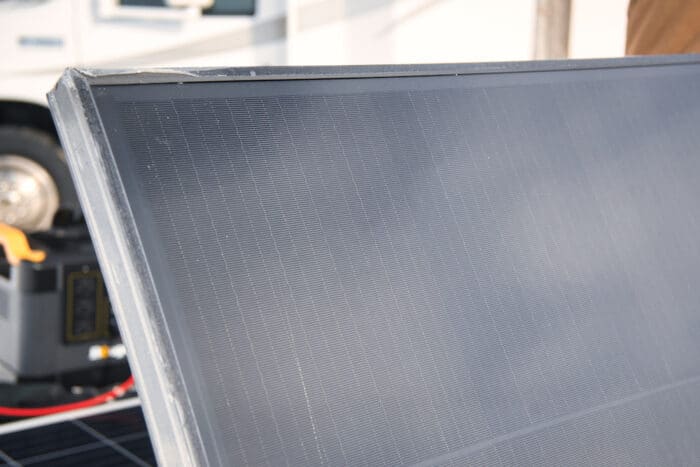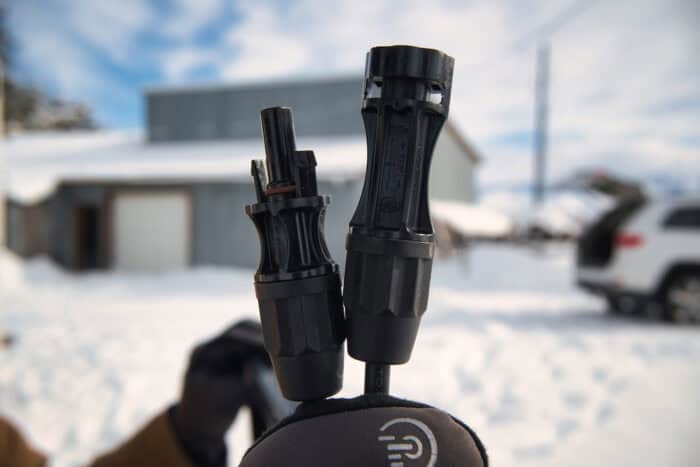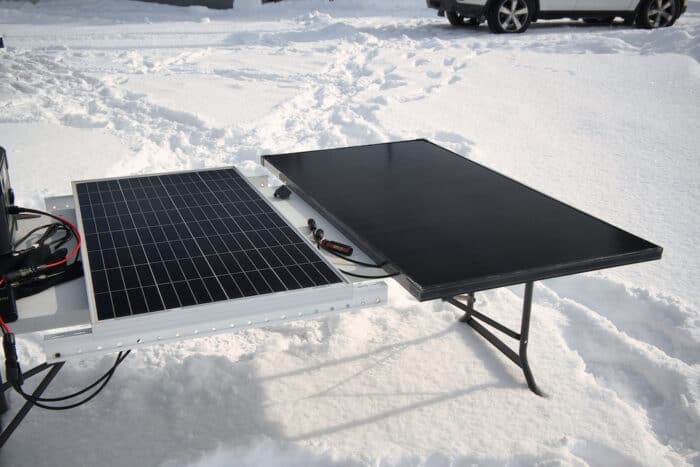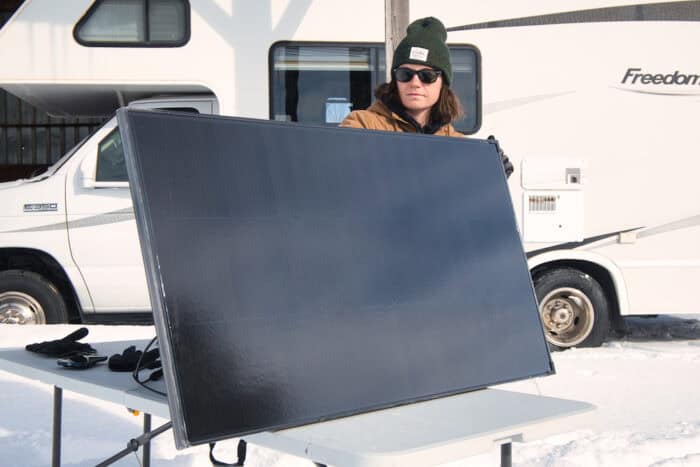Disclaimer: Solarpowerstore.ca sent this product to us for free for a review. That does not affect our opinion about the product. In this article, we list both what we like and dislike. Read more about this here.
The Bluesun 170W Is A Compact, Shingled Solar Panel For Less Than $100
Solarpowerstore.ca is a Canadian website where you can find a lot of products related to solar power. Batteries, inverters, solar generators, and, of course, solar panels.
They reached out and asked us to review one panel they sell, the Bluesun 170W.
Check Price on Solarpowerstore.ca
It’s a rigid 12V 170W panel that uses MC4 connectors. One thing that makes it special is the solar module technology used, that make it less affected by partial shade and improves efficiency.
Based on the specifications, it’s great for several applications. Mount it on a cabin, an RV, or use it as a portable panel.
With a waterproof junction box, it’s safe to leave outdoors even in the wettest types of weather.
Before any of that, the big question is: How does it perform? Well, let’s not waste any time and get right to the review.
Bluesun 170W Specifications And Features
It’s a 12V solar panel rated at 170W. A 12V panel does not output exactly 12V or 170W, and the specifications below are the actual ratings.
The solar modules are shingled, which is a technology used to improve performance in partially shaded environments.
A more conventional panel can drastically reduce power output even if a small part of the panel is covered. A shingled panel with its cells split up into several modules and lined up in horizontal is not as affected by partial shade.

Here are the listed ratings. These can also be found on the back of the panel or in the included manual.
- Max Power: 170W
- Solar Cell Type: Monocrystalline
- Open Circuit Voltage: 22.75V
- Operating Voltage: 19.25V
- Operating Amperage: 8.83A
- Size: 48.4 x 26.3 x 1.2 inches (123 x 67 x 3 cm)
- Weight: 19.8 lb (9 kg)
- Junction Box IP-rating: IP68
- Operating Temperature: -40°F to 185°F (-40°C to +85°C)
- Manufacture Warranty: 15 years
I recommend using at least a 10A solar charge controller with this panel, and it must be able to handle an 18-23 working voltage.
Thanks to its connectors and ratings, it’s compatible with a lot of portable power stations with a 12-30 voltage input range. You might need an adapter to connect it to your specific power station.
Sometimes power station manufacturers include a solar cable. These are often MC4 to DC adapters and make it possible to connect a panel like this directly to power stations.

The frame surrounding the panel is black and has several mounting holes for permanent installations.
Test Results
I tested the panel during a sunny day in Idaho, in the end of February. These are not the ideal conditions, so take that into account when you read the numbers below.
In my tests, I tested it both flat on a table and angled towards the sun. I also compared it to one of the Renogy 12V 100W panels I have mounted on my RV. Both were cleaned off before the tests and tested in similar conditions.

Both panels were tested when connected to a BougeRV 1100Wh power station, through a watt power meter.
The first number is the Bluesun 170W, the one in parenthesis is the Renogy 100W.
| Conditions | Bluesun 170W | Renogy 100W |
| Flat, partly cloudy | 44W | 19W |
| Tilted, partly cloudy | 81W | 47W |
| Flat, sunny | 108W | 58W |
| Tilted, sunny | 152W | 82W |
| Flat, sunny, partly covered | 63W | 22W |
| Tilted, sunny, partly covered | 129W | 32W |
Again, take these numbers with a grain of salt. These were not tested under the optimal conditions, and the angles we tested at were not the exact same for both panels as we did it manually.
The partly covered tests should especially not be taken as fact, since we didn’t have the tools necessary to cover the exact amount on both panels.
Since the tests were conducted during a mix of sunny and cloudy conditions, it’s not fair to fully rely on the difference in output between the panels.
Conclusion
The Bluesun 170W performed great in my tests and I recommend it to people looking for a 170W panel for permanent installations.
Since I could only test the panel for a little over a week, I can’t speak about long-term durability and overall performance over a longer period.
I wouldn’t use it as a portable panel, since it does not come with any protective bag and it’s awkward to handle a panel of this size.
For RV, home, or off-grid applications, I believe it’s a great solar panel that can produce a lot of electricity for its price.
Please leave a comment down below if you have questions.



Great review! The renogy numbers you posted are pretty similar to my boulder 100w briefcase portable solar panels. I went to the Bluesun website and contacted them if they ship to NJ. Do you have other panels that you recommend for permanent set-up? Looking for inexpensive but high end panels.
Hi,
I have used BougeRV and Eco-Worthy panels for permanent setups, and I like and can recommend both. This two pack of the Eco-Worthy 100W panel is pretty incredible (click to view on Amazon).
Thanks Jesse- what is the output you are getting from your BougeRV and Eco-Worthy panels?
Hi,
The highest I have seen from both is about 85W.